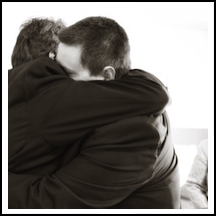 It takes a lot of love to put your own life on hold to care for a loved one who cannot look after themselves. Most carers who take on this role do so because they wouldn’t want it any other way. You are probably one of those people. Yet, like so many others in your situation, do you find that while you are busy caring for others, no one seems to be caring for you and your needs?
It takes a lot of love to put your own life on hold to care for a loved one who cannot look after themselves. Most carers who take on this role do so because they wouldn’t want it any other way. You are probably one of those people. Yet, like so many others in your situation, do you find that while you are busy caring for others, no one seems to be caring for you and your needs?
Whether you are caring for someone with a disability, a physical or mental health challenge, an elderly relative, or you’re a foster carer looking after stressed children, your role is often unpaid and undervalued. You probably haven’t attained a Masters in Public Health before having to take on this role, and you could be struggling but unable to let anyone know. Carers are the foundation of many of the services offered to the frail and needy in our society, and most of the success of programs to care for people outside of institutions falls on the carer’s shoulders.
Increased Awareness of a Carer’s Self Sacrifice
Throughout the world, there is an increasing awareness that carers do have needs that must be met and many countries are hosting focus weeks to highlight the important role that you, as a carer, play in our communities. Support groups are emerging in many cities that provide the opportunity for carers to meet and share their unique experiences and to find help and support from others who can empathize with them in their situation.
As a carer, if you can find one of these groups, you will find emotional support and information about any benefits that may be available to you, as well as advice about changing legislation that may assist you financially or emotionally.
Self Help Ideas
Despite all the help available, you are probably aware that most of the support you receive will come from your own family and you will need to self-care in order to maintain your own health and emotional well-being. Here are a few of the suggested self-care options for carers:
- Don’t feel guilty if you need to leave your loved one to spend some time on YOU. Everyone should spend a short period each day saying “no” to others and “yes” to themselves. Take time to indulge in something you enjoy doing and you will return refreshed and ready for the demands of your caring role.
- Ensure you take care of yourself physically, emotionally, and spiritually. Caring involves emptying your emotional tank, and this leaves you vulnerable to reduced immunity and other problems. Eating well, taking time to focus on your friends or religious faith, and even pursuing a public health degree online can all help you keep the situation in perspective and maintain your own health and well-being.
- Don’t feel guilty about saying yes to offers of help. Being a carer does not make you a superhero. We all need help and support, so when it’s offered, accept it and know that the family and friends offering it are contributing in their own way to the care of their relative.
If you are caring for a loved one, look for ways to fill up your emotional tank and access support from every opportunity that is offered to you.
Updated:
